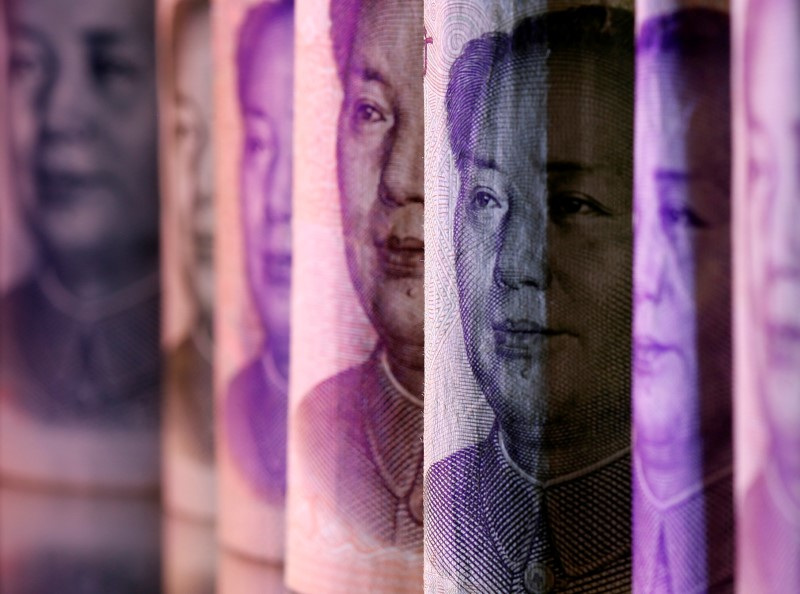Analysis-China manages to halt bond bulls in their tracks, for now
SHANGHAI (Reuters) - A long, frenzied bond rally in China has stalled, with prices down and turnover tumbling as investors step back after intensifying intervention by Beijing to stop yields from falling.
Ten-year treasury futures headed for a second weekly drop in a row on Friday, set for the largest fortnightly drop in nearly a year, even as a string of dismal economic indicators point to a slowing economy that would normally encourage bets on more policy easing and bond buying on one of the largest government bond markets in the world.
Exchange-traded bond funds in China had a spike in outflows on several days in a week where state banks were heavy sellers and media affiliated to the People's Bank of China reported warnings against reckless buying had begun to work.
Some bond-owning domestic wealth management products also slid to discounts to net asset values. The price action points to a market hunkering down for a tussle with authorities, just a raft of new bond sales are due in the coming weeks and months.
"What we are seeing here is a new round of PBOC action," said Julio Callegari, chief investment officer for Asia fixed income at J.P. Morgan Asset Management.
He has been reducing a long position in Chinese government bonds for months, partly in response to rhetoric from the central bank aimed at cooling the rally, and as a couple of months of solid bond issuance is expected ahead.
"We are closer to neutral, our longs are smaller," he said, with a reasonable scenario being yields eventually stabilising.
Long-dated bonds have been the focus over the past two weeks as China has called out risks of an asset bubble and slapped restrictions on the duration of new bond funds and increased scrutiny over brokers and banks bond dealings.
Ten-year yields on Friday were up nearly ten basis points (bps) from last week's record lows, while 30-year yields have bounced 8 bps to 2.383%.
Yields rise when bond prices fall.
A week ago the number of wealth management products whose market value dropped below net asset value jumped to hit 385 the highest since March 2023, according to Zheshang Securities and the market is showing other signs of deteriorating.
On Thursday just 30.9 billion yuan ($4.3 billion) worth of China's current 10-year note was traded interbank compared to an average daily volume of 122 billion yuan last week.
Zhao Jian, head of Atlantis Finance Research Institute, said that authorities' moves to lift falling yields in a weak economy were "unfathomable," in a commentary on social media.
While aimed at reducing risk, he said the measures would likely damage market function by making participants reluctant to trade, eventually undercutting its financing and investing purpose.
China will stick to a supportive monetary policy and maintain policy stability, its central bank governor Pan Gongsheng said in an interview with state news agency Xinhua on Thursday.
VOLATILITY
China's bond rally has run for years as pandemic lockdowns and a property-market collapse choked economic growth and the post-COVID recovery has disappointed at every turn - driving interest rates lower and therefore pushing bond prices higher.
Bond market returns are higher than deposit rates, which is attracting households. New bank lending is also scraping 15-year lows meaning idle bank capital has also streamed into bonds.
Authorities have pushed back, fearing a market bubble and the diversion of more and more money away from productive use.
To be sure, none of those forces are weakening, leading to deepening battle lines between market participants and authorities.
Bond supply is another wildcard, since as of end-July China had sold less than half of the combined 5.62 trillion yuan in local government and treasury bonds it plans for the year.
Ju Wang, head of greater China currency and rates strategy at BNP Paribas (OTC:BNPQY ), also notes that foreigners who have been drawn in by lucrative swap rates may take the opportunity to book profits and close positions.
In a product disclosure on Thursday, the wealth management unit of Bank of Hangzhou said China's weak economic recovery means it will be easier for yields to go down than to go up.
But the bank expects more volatility as yields are already low, and is preparing to "seize trading opportunities".
($1 = 7.1730 Chinese yuan renminbi)
Source: Investing.com
